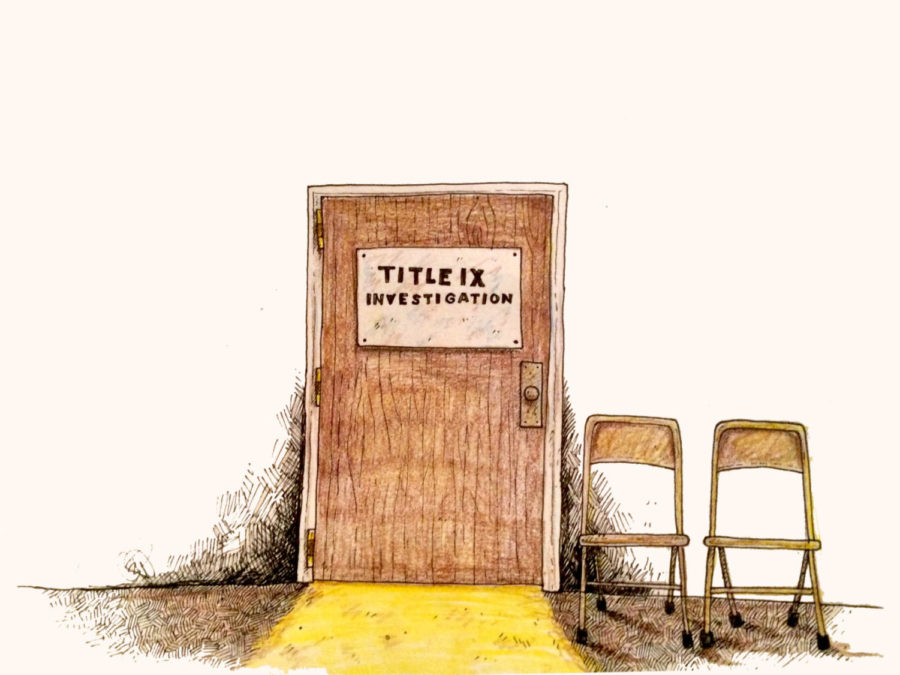Flawed justice in UK’s Title IX system
November 3, 2016
If UK wants to help survivors of sexual assault, why does it fight to protect the people who hurt them?
Earlier this year, UK trustee David Hawpe compared the way the university deals with sexual assault to the way the Catholic Church protected priests who molested children.
Hawpe wasn’t far off.
At UK, people accused of sexual assault can simply leave without a trace, moving to other universities without worry that their offenses could come to light.
It is this flawed system that UK is out to defend in its lawsuit against the Kentucky Kernel.
UK says it wants to protect survivors, but further analysis raises doubts about that argument.
So here’s how it works:
When UK’s Title IX office finds that someone likely committed sexual assault, it recommends sanctions that could include suspension, expulsion, or for employees, termination.
Employees have the ability to resign instead of being fired, and, as in the case of former associate professor James Harwood, the university sometimes continues to pay those employees after they have accepted sanctions.
In either case — whether they resign or are fired — UK files a “separation sheet” that is supposed to explain why the employee left.
But here’s the thing: the supervisors who fill out separation sheets are not required to include findings of Title IX investigations, even violations of sexual misconduct policy.
So a faculty member could sexually assault a student, resign, continue to receive a paycheck, and get a job at another university without that university ever knowing he or she resigned because of a Title IX investigation into sexual assault.
The system can fail survivors too.
As one sexual assault survivor who reached out to the Kernel explained, UK can neglect to inform survivors of an important part of an investigation’s conclusion — what will happen to their perpetrator.
The survivor who spoke with the Kernel ran into her rapist multiple times on campus, even though Title IX officials led her to believe he would no longer be able to make contact with her.
As the Kernel continues to report on sexual assault, other survivors similar to the one mentioned above have come forward wanting to tell their stories. Many are dissatisfied with how UK handled their cases.
Yet UK claims the Kernel is to blame for fewer reports of sexual assault on campus.
UK’s system of dealing with sexual crimes is riddled with flaws that have serious consequences, like survivors running into their rapists on campus, or faculty members who assaulted students leaving for another university where they can commit further crimes.
These flaws are the more likely cause of too-few reports of sexual assault. Rather than pointing the blame at its own student newspaper, UK must look inward and deal with the problems inherent in the system.
Here are a few suggestions:
- The Dean of Students should be required to inform other universities about students who leave UK because they committed sexual offenses.
- Supervisors who fill out separation forms should be forced to list the actual reason an employee left the university if the employee committed a sexual offense.
- UK should keep survivors updated on the sanctions levied after investigations, and should warn survivors if the alleged sexual offenders will be able to remain on campus.
- Lastly, UK should be more transparent about what this system actually entails.
Many students believe Title IX investigations are criminal courts with anonymity — a place where students can get justice for crimes without their names being made public.
But that’s not the truth.
Sexual assault or harassment survivors can get proper recourse for gender discrimination complaints through UK’s system, but they should know that, unless they go to police, offenders will never see jail time and may be allowed to go to other universities where they could commit similar crimes.
Rather than ramping up its dishonest propaganda campaign against the Kernel, UK would be wise to use those resources to correct these problems.
If UK cares about survivors of sexual assault, it will stop protecting the people who hurt them.

























































































































































